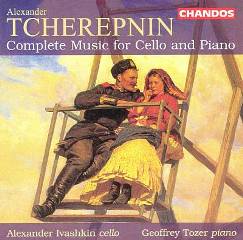Alexander Tcherepnin - Complete music for cello and piano (1999)
Alexander Tcherepnin - Complete music for cello and piano (1999)

Cello Sonata No. 1, Op. 29 11:06 1 I Allegro 3:52 2 II Cadenza - Tres rythmé et énergique - Cadenza 3:36 3 III Allegretto - Allegro 3:33 Cello Sonata No. 2, Op. 30 No. 1 9:43 4 I Moderato - Allegro molto - Moderato tranquillo 4:09 5 II Lento 2:53 6 III Vivace 2:34 Cello Sonata No. 3, Op. 30 No. 2 10:45 7 I Allegro moderato 5:24 8 II Andantino 3:37 9 III Presto 1:34 The Well-Tempered Cello, Op. 38 22:17 (Twelve Preludes on a Scale of Nine Intervals) 10 I Moderato 1:26 11 II Tempo risoluto 2:16 12 III Animato 0:56 13 IV Moderato 1:59 14 V Mesto 2:13 15 VI Allegro 1:53 16 VII Allegretto 1:26 17 VIII Lento 1:52 18 IX Allegretto 2:25 19 X Allegro 0:48 20 XI Moderato tranquillo 2:15 21 XII Comodo 1:44 Songs and Dances, Op. 84 11:33 22 I Georgian Song 3:29 23 II Tartar Dance 1:14 24 III Russian Song 3:53 25 IV Kazakh Dance 2:52 26 Ode 1:39 ------ 67:32 Alexander Ivashkin - cello Geoffrey Tozer – piano Recorded in: Great Hall, Arts Centre, Christchurch, New Zealand 14-16 June 1999
Russian-born Alexander Tcherepnin (1899-1977) composed prolifically from a very early age. By the time he began formal studies in his late teens, he had already composed hundreds of pieces, including more than a dozen piano sonatas. After the Russian Revolution, Tcherepnin left the country and eventually settled in France, where he completed his studies at the Paris Conservatory. He traveled extensively, and music of the Far East provided a major stylistic inspiration to his music. Tcherepnin is particularly noted for creating his own harmonic languages. The most famous of his synthetic scales came to be known as the "Tcherepnin scale." This super-audio collection includes the composer's complete output for cello and piano. ---amazon.com
Alexander Tcherepnin was a Russian-born composer, pianist and conductor known for his cosmopolitan style that included influences from France and the Far East. Tcherepnin's father, Nikolay Tcherepnin, was an important composer and conductor, and it was his influence and teaching that formed Alexander's early training. In 1921 Tcherepnin's family fled the aftermath of the Bolshevik revolution, and the young composer began his career in their adopted home of Paris. From the beginning he favored new and experimental techniques, and during the 1920s he fomulated his own 9-tone scale (now called the Tcherepnin scale), consisting of three overlapping major and minor tetrachords; this allowed for the simultaneous sounding of major and minor sonorities, which the composer found particularly satisfying. He also developed a new form of counterpoint -- called "interpoint" -- which allows for the combination of several self-contained contrapuntal structures. These musical devices were not so much abstract concepts as attempts on the part of the emerging composer to codify his very instinctive and individual approaches to sound and rhythm. These tendencies had already been expressed in early works, such as the bitonal Pièces sans titres, Op. 7, from 1913.
From 1934 through 1937, he toured the Far East, using Tokyo, Shanghai, and Peking alternately as bases of operation; he would have considerable influence as a teacher of both Japanese and Chinese composers of the period. He also met his wife, the pianist Lee Hsien Ming while in China. The newly married couple returned to Paris in 1938, but the turmoil of WWII put a stop to musical activities. Immediately following the war, however, he resumed his creative output, eventually relocating to Chicago in 1950, and finally settling in New York in 1964.
Although Tcherepnin's style was Russian at heart, it lacked much of the Romantic melancholy and overt nationalism seen in other Russian-born composers. Instead, his earlier works are characterized by a French leanness and clarity and an emphasis on the clean articulation of form. Some, such as in the Second Piano Concerto (1923), bear a similarity to the works of Prokofiev in their motoric rhythms. Tcherepnin himself considered his style to be "Eurasian." Notable works include the Piano Concerto 4 (1947), the Cinq études de concert and his opera The Farmer and the Nymph (1952) -- all of which have a distinctly oriental sound -- and the Fifth Piano Concerto (1963) and Serenade for Strings (1964), both of which suggest aggressive exploration of new concepts at the end of his life. Tcherepnin produced a wide variety of works in every genre, eventually even incorporating electronic elements in his radio score The Story of Ivan the Fool. ---Steven Coburn, Rovi
download (mp3 @320 kbs):
yandex 4shared mega mediafire zalivalka cloudmailru oboom uplea








